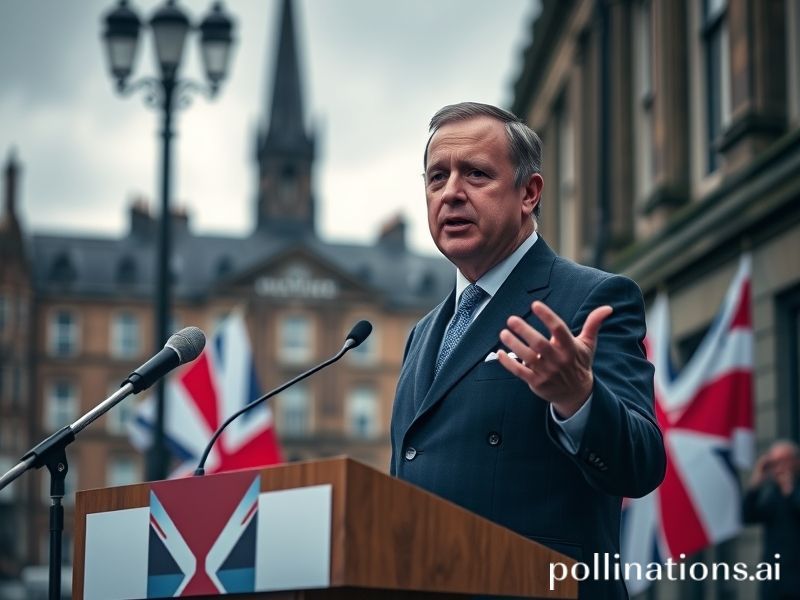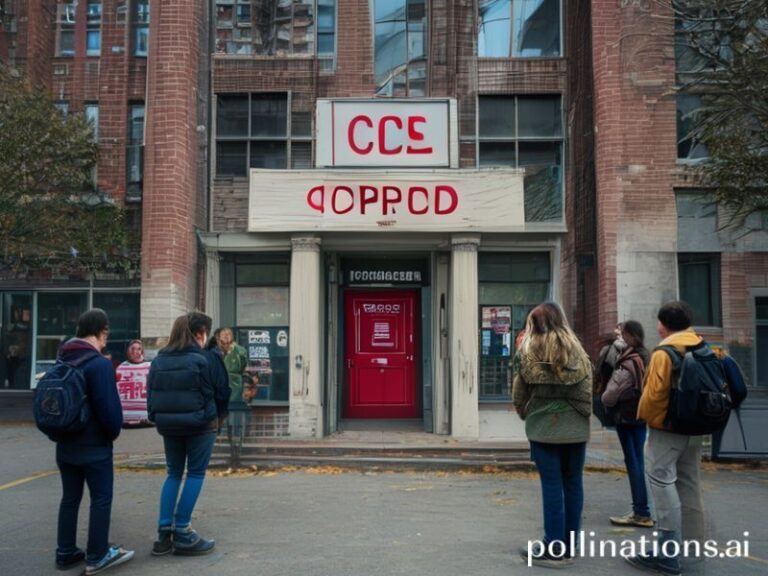Last Red Dot Standing: How One Scottish MP Became the World’s Unlikeliest Democratic Barometer
The Curious Case of Ian Murray: A Small Scottish MP Who Accidentally Became a Global Weather Vane
By the time the BBC’s London graphics department had finished animating Ian Murray’s face over a spinning globe, the man himself was probably still stuck on the 07:48 from Edinburgh to London, reheating a Pret croissant between his knees. Such is the glamour of being the last Labour MP left standing in Scotland—an honor roughly equivalent to being the last vegetarian at a Texas barbecue: laudable, lonely, and faintly ridiculous to everyone watching.
Yet Murray’s re-election in the 2019 bloodbath did more than keep his seat warm; it turned him into an unlikely barometer for the entire Western democratic experiment. When the last red dot on the Scottish map refused to blink out, analysts from São Paulo to Seoul leaned in, wondering if the populist tide had finally met its match or if Labour had simply misplaced the off-switch. Either way, a balding former student-union president from Alnwick became the geopolitical equivalent of that one stubborn raindrop clinging to the wing mirror of history.
The international press loves a tidy metaphor, and Murray obliges. Tokyo’s Nikkei ran a pixelated photo of him above the headline “Last Samurai of Social Democracy,” apparently unaware that sushi in Edinburgh is now both better and cheaper than in Shibuya. Meanwhile, Germany’s Die Zeit profiled him as “die einsame Insel”—the lonely island—proving that Teutonic wit is still an oxymoron. Each dispatch carried the same subtext: if Murray goes, does liberal centrism follow? The world’s autocrats, busy polishing their gold-plated ballot boxes, watched like hawks eyeing a limping rabbit.
Murray’s day job—shadowing the SNP’s constitutional hobby horse while pretending the Labour brand isn’t decomposing faster than supermarket strawberries—adds another layer of farce. He has spent years arguing that the United Kingdom must remain united so that Scotland can continue exporting Tunnock’s teacakes and existential despair in equal measure. The irony, of course, is that the harder he fights to preserve the Union, the more he resembles a marriage counselor trying to save a couple who have already listed the house on Zillow. International observers note that separatist movements from Catalonia to Quebec now study Murray’s survival tactics the way Silicon Valley studies caffeine: not because it’s healthy, but because it works just well enough to keep the corpse twitching.
Then there’s Brexit, the slow-motion car crash Murray warned about while most of Westminster was still fastening its seatbelt around its own neck. When the trade barriers went up like badly installed IKEA shelving, Murray’s inbox filled with plaintive emails from Scottish salmon farmers whose fish now require more paperwork than a North Korean exit visa. He forwarded these to the Department for International Trade, which replied with a helpful link to a webinar titled “Exporting Jam to Japan: A Beginner’s Guide.” Somewhere in Canberra, an Australian trade attaché laughed so hard he dropped his flat white.
Of course, Murray’s fiercest battles aren’t with Brussels bureaucrats or Tory ministers—they’re with the algorithm. Every time he tweets support for, say, tougher sanctions on oligarchs, a swarm of bots descends to accuse him of being a “globalist lizard” financed by George Soros and Big Irn-Bru. He blocks them with the weary efficiency of a nightclub bouncer confiscating fake IDs. Meanwhile, in a troll farm outside St. Petersburg, a twenty-something earning four rubles a retweet wonders why this particular Scottish MP keeps ruining his KPIs.
What does it all mean, beyond the cheap thrill of watching one man juggle constitutional grenades while riding the 07:48? Simply this: in an era when political identity is supposed to be as fluid as crypto-currency, Ian Murray remains stubbornly analogue—an MP who still carries paper constituency mail in a reusable shopping bag, who believes in trains that arrive, and in unions that stay united. The planet’s strongmen would prefer him extinct; the commentariat would prefer him more telegenic. Yet there he is, every Thursday at Prime Minister’s Questions, politely heckling like a supply teacher who’s finally lost patience.
The lesson for the rest of us, from Taipei to Timbuktu, is that democratic resilience sometimes looks less like a triumphant march and more like one slightly balding man refusing to give up his seat. It’s not heroic. It’s just irritating enough to matter. And in 2024, irritation may be the closest thing we have to hope.







